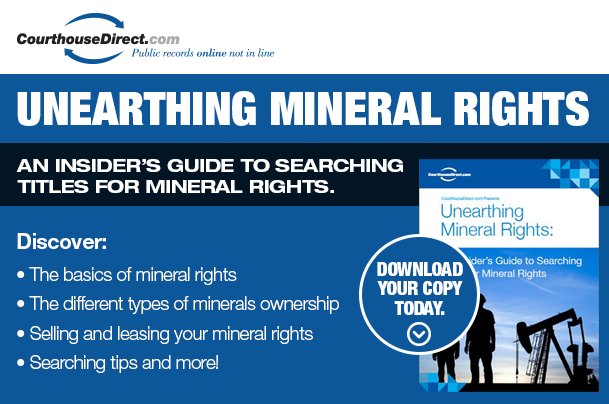Were you aware that the owner of the property rights for the surface of the ground is not necessarily the owner of the mineral rights beneath it? It all depends on how the property has been treated in the past or whether the owner of both surface and subsurface decides to sell the rights to one or the other.
Severed Mineral Rights
When the surface property is owned by one person or group and the rights to the minerals beneath it are owned by a different party, the mineral rights are considered to be “severed” or split from the surface property as far as ownership rights. Once this occurs the mineral rights can be transferred independently of the surface rights and vice versa. The surface and the mineral layer are treated as two separate, individual pieces of property.
Another point to ponder: mineral rights are dominant over surface rights in certain respects. The owner of the mineral rights has the right to reasonable use of the surface (which is owned by someone else) to explore for or produce the minerals without the permission of the surface land owner.
Legal Methods of Severing Mineral Rights
Mineral rights are severed from property rights by a couple of methods.
- By deed: the owner of both surface and subsurface rights sells or “grants by deed” all or part of the mineral rights under the ground. This is recorded by County Registered Deed.
- By reservation: In this instance the owner of both surface and subsurface rights sells, or grants by deed or Federal patent, the surface while retaining all or part of the mineral rights. This is also recorded by County Registered Deed. If a patent is used then the General Land Office also records it.
Fragmented Mineral Rights
Once severed, mineral rights can be deeded or sold in whole or in part from that point forward. If mineral rights are split amongst more than one owner, they become fragmented. Theoretically, mineral rights ownership could be shared by any number of parties.
Unfortunately, once fragmented, keeping track of the mineral rights becomes problematic. As the rights are sold, inherited, or otherwise passed around, the knowledge of ownership can be lost. Mineral rights can also be controlled by trustees or by the guardian of a mineral owner.
Mineral rights can also become fragmented simply by the process of repeated inheritance. Perhaps the first generation of owners dies and passes ownership of mineral rights equally to the second generation but this is not mentioned in the will. Then the second generation dies and the rights of each portion are further divided between the members of the third generation.
Do You Think You Own Mineral Rights?
Sorting out who owns the mineral rights begins with the country registrar of deeds. You may wish to retain an attorney to verify any mineral rights you have been told you may own. At the extreme, a court of law will become involved to make an ownership determination.





















